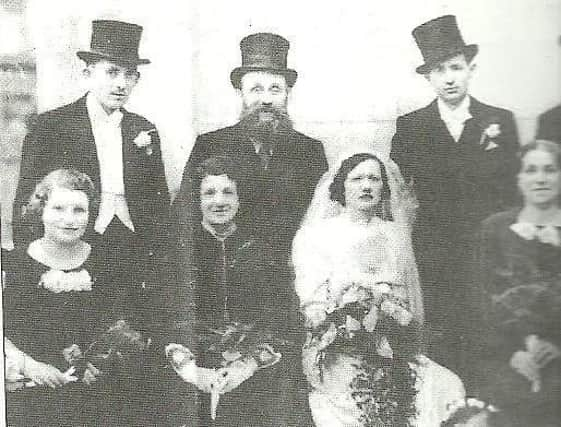One Irish Jew from Eichmann's hit-list of 4,000 died in Holocaust


One offered chilling glimpses into a post-WII scenario that historians have often pondered - what would have happened if Hitler had been victorious?
“Eichmann’s list of the number and location of Jews in Europe which were to be targeted is a poignant illustration of the Nazi’s obsession with the Jews,” stated the short, sad, succinct note, which ended “It always moves me to tears when it hits home that the 4,000 Jews listed in Ireland included my dad and his family.”
Advertisement
Hide AdAdvertisement
Hide AdAccompanying the note was a copy of an unnerving, typewritten document from the Wannsee Conference on January 20, 1942.
The Wannsee Conference was a meeting of senior Nazi officials that was held in a grand old mansion in the suburb of Wannsee, Berlin.
It was here that some of Hitler’s highest-ranking cohorts and SS officers came together to plan the transportation of Jews to concentration camps and death camps.
Adolf Eichmann, Nazi SS-Obersturmbannführer (Lieutenant Colonel) and one of the main organisers of the Holocaust, provided the conference with detailed numbers of Jews in Europe, and their whereabouts - his ruthless shopping list for the gas chambers.
Advertisement
Hide AdAdvertisement
Hide AdEichmann’s typed document listed the Jews under two categories - ‘A’ (countries under direct Reich control or occupation) and ‘B’ (allied states, neutral, or at war with Germany).
Horrifyingly, Estonia (Estland) is listed as ‘Judenfrei’ (free of Jews), because the 4,500 Jews who remained there after German occupation had already been exterminated.
On the ‘B’ list, itemised between Finland and Italy, were Ireland’s 4,000 Jews.
It is frightening to think that if Hitler had been victorious Ireland might soon have been listed as ‘Judenfrei’.
Advertisement
Hide AdAdvertisement
Hide AdA second note to Roamer outlined another Irish link to Hitler’s genocide which, tragically, came to pass.
The note introduced the only Irish citizen known to have died in the Holocaust - Ettie Steinberg.
Ettie Gluck (nee Steinberg), husband Vogtjeck and their little son Leon, died in Auschwitz in 1942.
Vogtjeck was Belgian, and their son Leon was born in Paris.
Advertisement
Hide AdAdvertisement
Hide AdEttie (Esther) Steinberg was one of seven children born to Jewish-Czechoslovakian parents, Aaron Hirsch Steinberg and Bertha Roth, on January 11, 1914.
They lived in 28 Raymond Terrace, off Dublin’s South Circular Road.
She was definitely an Irish citizen, indeed Belfast played an important role trying to save her life, but whether she was born in Ireland or not is somewhat unclear.
There’s a suggestion that she was born in Czechoslovakia and the family relocated to London, and then to Ireland in 1926.
Advertisement
Hide AdAdvertisement
Hide AdLittle is known about her life before she wed, though it’s thought that she worked as a seamstress.
In 2008, her sister Fanny Frankel, living in Toronto, recalled that Ettie had ‘golden hands’ and was a gifted seamstress and that she greatly cherished a suit that Ettie made for her.
Others who knew Ettie said she was a “beautiful girl, tall and slim, with wonderful hands.”
In July 1937, Ettie married her Belgian boyfriend Vogtjeck Gluck in Dublin’s Greenville Hall Synagogue.
Advertisement
Hide AdAdvertisement
Hide AdHer husband came from a Belgian family of goldsmiths and the newlyweds moved to Antwerp to be close to the family business.
When war broke out and Belgium was threatened by Hitler’s advancing army, Vogtjeck and Ettie fled to France, hoping for safety and security.
They set up home in Paris, where son Leon was born on March 28, 1939.
But the threat of violence spread through France in 1940, putting them in grave danger.
Advertisement
Hide AdAdvertisement
Hide AdFor two years they moved from hideaway to hideaway in France, supported by sympathetic friends and acquaintances.
They rarely stayed anywhere for more than a day or two. Back home in Dublin, the Steinberg family tried desperately to get Ettie and her husband and son back to Ireland.
Eventually they secured three visas from the British Home Office in Belfast which permitted Ettie, Vogtjeck and Leon to come to Northern Ireland.
The Steinbergs sent the life-saving documents to Toulouse, where they knew Ettie and her little family was hiding.
The visas arrived 24 hours too late.
Advertisement
Hide AdAdvertisement
Hide AdThe Glucks were caught in a hotel room, in a round-up of Jews on the September 2, 1942.
They were put on a train to Auschwitz.
Ettie wrote a hasty, coded note on a postcard and threw it from the crowded train.
Amazingly, a passer-by found the card and posted it to Ireland.
The cleverly coded note was a heart-breaking ‘parable’ derived from her Jewish upbringing.
Advertisement
Hide AdAdvertisement
Hide Ad“Uncle Lechem we did not find,” she wrote, “but we found Uncle Tisha B’av.”
‘Lechem’ is the Hebrew word for bread and ‘Tisha B’Av’ is a Jewish fasting day commemorating the destruction of the temple.
The words translated into a tragic surrender to the inevitable - “we did not find plenty, but we found destruction.”
Ettie knew full well what awaited in Auschwitz.
The train pulled into the camp on September 4, 1942.
Ettie, Vogtjeck and little Leon were hustled along the platform with about a thousand other passengers on a cruelly short, onward-journey to the gas chamber.
Local information about Holocaust Memorial Day events are at hmd.org.uk